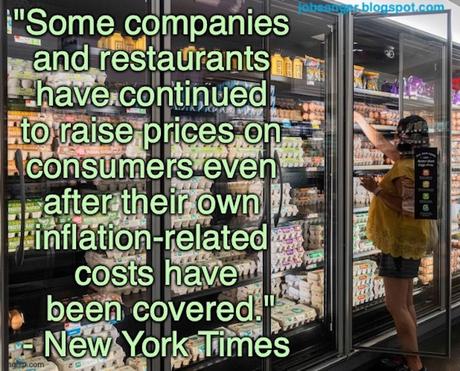
Businesses would like you to think they have been forced to increase prices to cover the increase in their costs. But what they won't tell you is that they're using inflation to raise their prices far beyond their costs. In short, they are price gouging their customers.
Here is part of a New York Times article on this:
A year ago, a bag of potato chips at the grocery store cost an average of $5.05. These days, that bag costs $6.05. A dozen eggs that could have been picked up for $1.83 now average $2.90. A two-liter bottle of soda that cost $1.78 will now set you back $2.17.
Something else is also much higher: corporate profits.
In mid-October, PepsiCo, whose prices for its drinks and chips were up 17 percent in the latest quarter from year-earlier levels, reported that its third-quarter profit grew more than 20 percent. Likewise, Coca-Cola reported profit up 14 percent from a year earlier, thanks in large part to price increases.
Restaurants keep getting more expensive, too. Chipotle Mexican Grill, which said prices by the end of the year would be nearly 15 percent higher than a year earlier, reported $257.1 million in profit in the latest quarter, up nearly 26 percent from a year earlier.
Although food companies are prominent examples of how rapid inflation is being passed from producers to consumers, the trend is evident across a wide variety of industries. Executives from banks, airlines, hotels, consumer goods companies and other firms have said they are finding that customers have money to spend and can tolerate higher prices. . . .
For years, food companies and restaurants generally raised prices in small steps, worried that big increases would frighten consumers and send them looking for cheaper options. But over the last year, as wages increased and the cost of the raw ingredients used to make treats like cookies, chips, sodas and the materials to package them soared, food companies and restaurants started passing along those expenses to customers.
But amid growing concerns that the economy could be headed for a recession, some food companies and restaurants are continuing to raise prices even if their own inflation-driven costs have been covered. Critics say the moves are all about increasing profits, not covering expenses. Coca-Cola, PepsiCo and Chipotle did not respond to requests for comment.
“The recent earnings calls have only reinforced the familiar and unwelcome theme that corporations did not need to raise their prices so high on struggling families,” said Kyle Herrig, the president of Accountable.US, an advocacy organization. “The calls tell us corporations have used inflation, the pandemic and supply chain challenges as an excuse to exaggerate their own costs and then nickel and dime consumers.”
So far, food companies and restaurants have been able to raise prices because the majority of consumers, while annoyed that the trip to the grocery store or drive-through for takeout costs more than it did a year ago, have been willing to pay. But there are plenty of shoppers, including those with lower incomes or retirees on fixed budgets, who say the higher prices have led to changes in their routines. . . .
Over the last year, the price of food eaten at home has soared 13 percent, according to the Bureau of Labor Statistics, with some items spiking even higher. Cereals and bakery goods are up 16.2 percent from a year ago, closely followed by dairy, which has risen 15.9 percent.
The cost of eating at restaurants has risen 8.5 percent over the same period.

